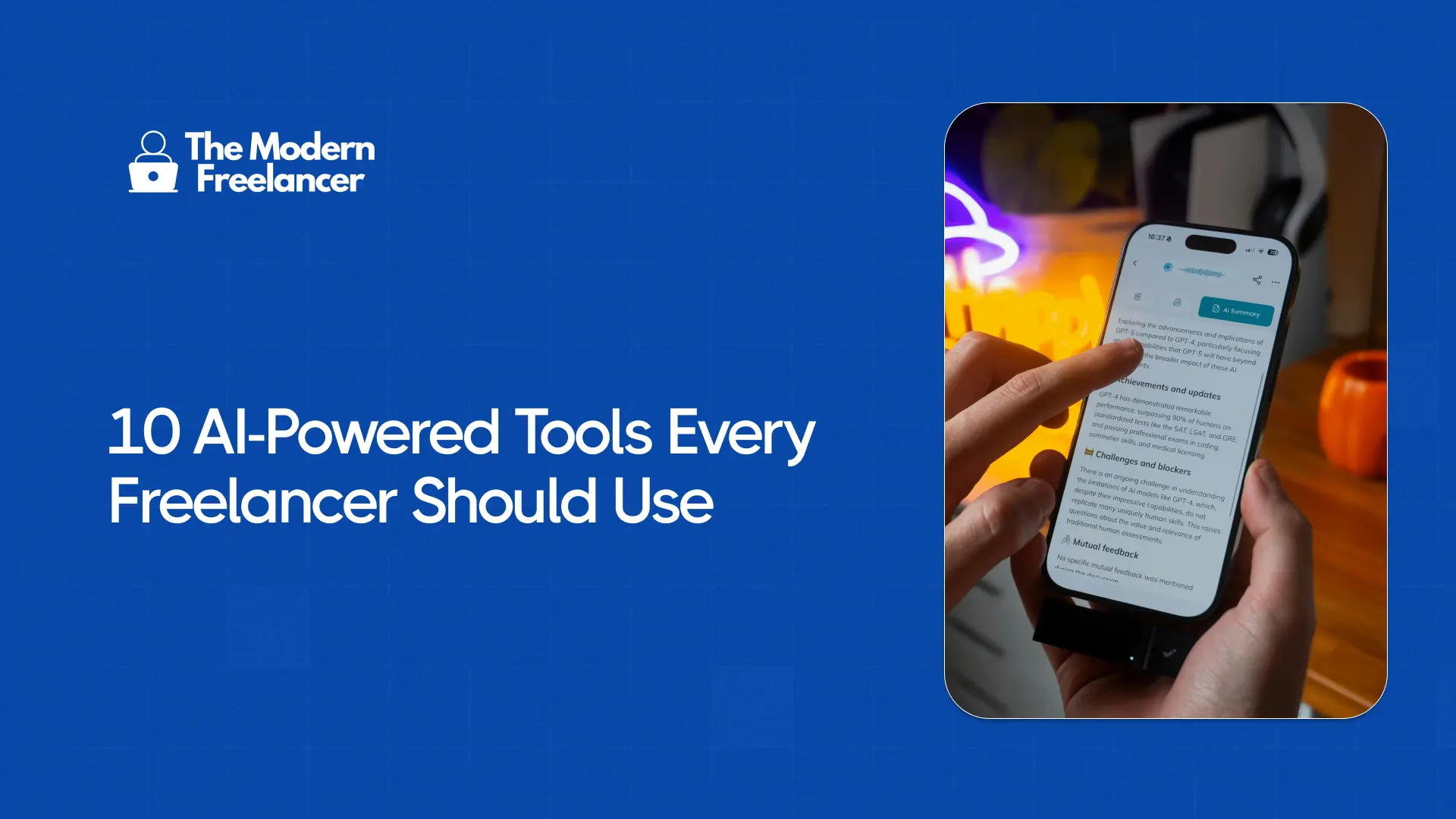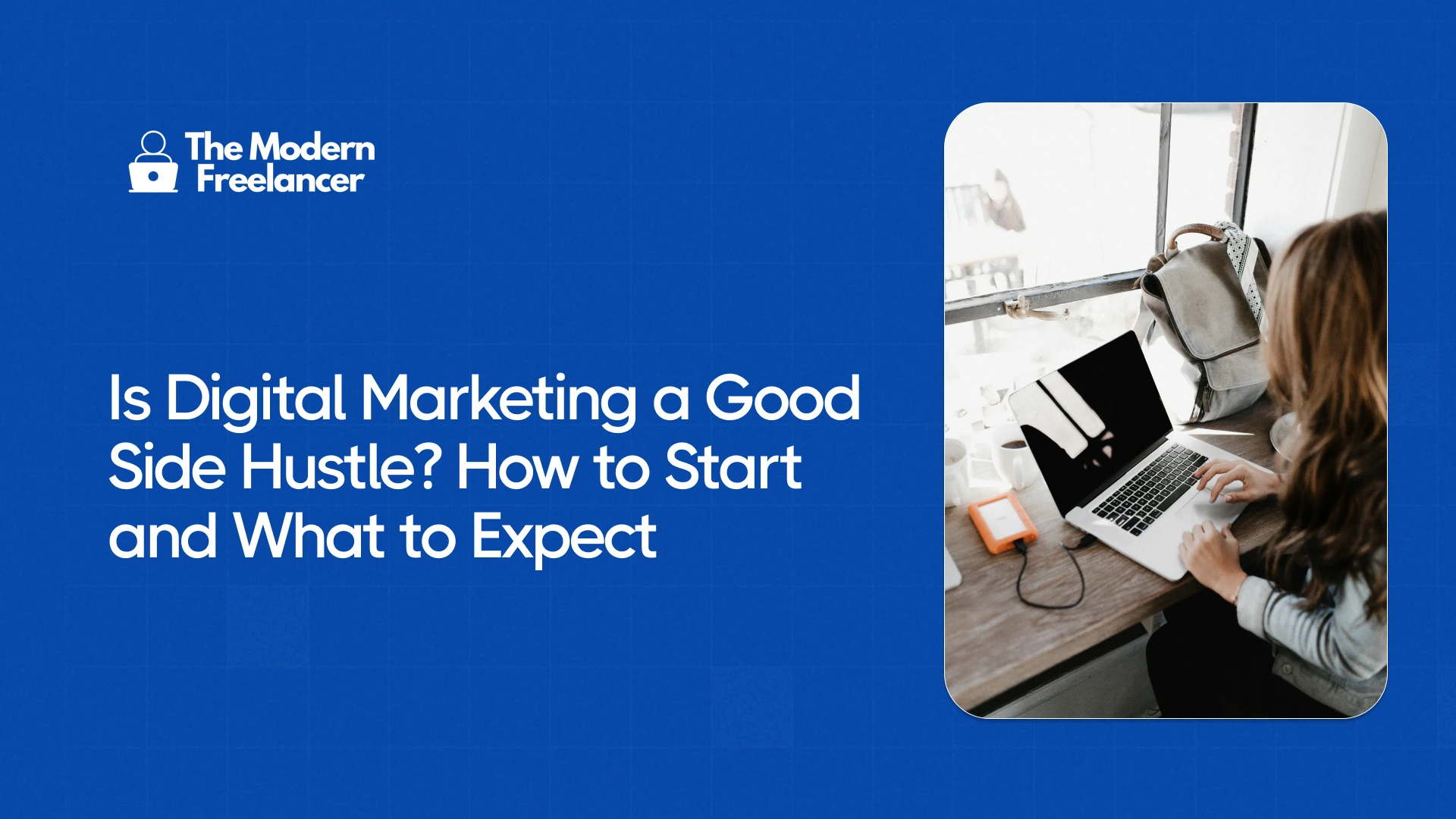Screw "Average": What Is Personality in Marketing and How Can You Use It?
Show your real personality to beat bland marketing, stand out with personality-based marketing, attract better clients, and build a personal brand.

Heads up: Some of the links below are affiliate links, which means I may earn a small commission if you choose to use them — at no extra cost to you. I only recommend tools I personally use and trust.
This photo popped up in my memories this week - a coworker posted it on their IG story back in 2019 when I was working at Mutesix.

Looking back, it's pretty cringe. The "F*CK AVERAGE" mug, the whole vibe - definitely peak "try-hard" energy from my Gary Vee hustling era.
But here's the thing: it worked.
Back then, I had a reputation at the agency: "There's nothing that guy won't do to make his clients successful."
I leaned into that reputation hard - buying this ridiculous mug, drinking coffee out of it at my desk, making it part of my personality.
Was it over the top? Absolutely. But as a junior Facebook campaign manager starting from scratch with nothing to prove myself, that "try-hard" energy did exactly what it was supposed to do.
It made me memorable.
Last week, I was listening to Steve Varsano, founder of The Jet Business, talk about personal branding on a podcast. He said something that made me think about this old photo:
"Building your personal brand is more important than the brand of the company you work for."
That cringe mug taught me something crucial about personal branding that most freelancers tend to forget:
Everybody is “branded” by others, whether they like it or not.
What is Personality in Marketing?
Here’s the thing most freelancers miss: clients don’t hire skills first. They hire humans first. Skills justify the decision, but personality in marketing is what gets you remembered, referred, and trusted.
Personality in marketing simply means letting your actual voice, tone, humor, quirks, values, and point of view show up in your work. It’s the difference between:
- sending a generic cold email vs. sending one that sounds like a real human wrote it
- writing “deliverables and timelines” vs. explaining things like you're talking to a client over coffee
Most freelancers hide behind “professionalism” because it feels safe. The problem? Safe blends in. Safe disappears. Safe is average.
When your personality shows up, your marketing feels human, and humans buy from humans, not templates.
Personality in Brand Marketing Check
Steve's insight hit different: Everyone IS a brand whether they realize it or not. When you graduate, change careers, or go freelance, you have to recreate your personal brand from scratch.
The key question: "What do you want people to say about you when they hear your name in a conversation?"
Most freelancers never ask this question. They focus on skills, portfolios, and being "professional" in the most generic sense possible.
That's exactly backwards.
Everyone IS a brand whether they realize it or not.
Your personality already markets you. A marketing client notices your tone, your energy, how you communicate, how you solve problems, and how you show up.
That’s personality in marketing, and it’s shaping your brand even if you’re not paying attention.
If your default setting is “professional but forgettable,” you blend into the background. But if your clients describe you as the person who communicates clearly, brings energy, makes the process enjoyable, or shows up with solutions… that becomes brand equity.
Why Should You Use Personality-Based Marketing?
Because clients remember people, not portfolios. Personality-based marketing builds emotional connection. It makes clients feel like they already know you before they’ve even met you. That’s why people follow creators, not companies. It’s also why personal branding marketing is exploding — because it drives conversions.
Why it works:
- You instantly stand out in a saturated market
- You attract clients who actually like working with you
- You repel nightmare clients who don’t vibe with your style (a blessing)
If you’ve ever thought, “I need better clients,” but you sound like every other freelancer alive…
That’s your answer.
Why Personal Branding in Marketing Matters Even More for Freelancers
If you're freelancing at an agency, Steve's advice applies even more. You're building your reputation within a system where everyone has similar skills. Your personal brand is what gets you the best projects, the biggest budgets, and the client relationships that follow you.
If you're full-time freelancing, it's even more critical. Brands won't remember your "agency name" - they'll remember YOU. There's no corporate logo to hide behind, no company reputation to lean on.
A great personal branding strategy turns cold prospects into warm leads before you ever get on a Zoom call — because they think:
“I already know this person. I already like this person. I already trust this person.”
And the wild part? This is exactly why personal branding equals pricing power. When people want YOU specifically, you stop competing on price and start competing on value.
(And for those of you still stuck working a 9-5, check out why freelancing is actually safer than a 9-5 in 2025)
The "F*ck Average" Principle
Trying to be "professional" like everyone else is the fastest way to be forgettable.
Average is invisible. Average doesn't get referred. Average doesn't get remembered when budgets open up.
My mug was ridiculous, but it sparked conversations. People remembered "the guy with the F*ck Average mug who stays late to fix campaigns." That reputation led to bigger clients, better projects, and eventually the confidence to go freelance.
It's better to be memorably authentic than forgettably professional.
What Are the Big 5 Personality Traits in Marketing?
If you want to layer psychology into your branding, here’s a framework marketers use constantly: the Big 5 personality traits. They help identify your natural strengths and show how your unique style can make your freelance marketing business more magnetic.
The Big 5 are:
- Openness – creativity, curiosity, innovation. If you love experimenting and bringing fresh ideas, make that part of your brand.
- Conscientiousness – reliability, organization, discipline. Clients LOVE the freelancer who never misses deadlines and is two steps ahead.
- Extraversion – enthusiasm, energy, confidence. Great for sales calls, recording content, and leading strategy sessions.
- Agreeableness – empathy, communication, collaboration. Perfect for client-facing roles, building long-term relationships, and user-focused work.
- Neuroticism – awareness of risk, focus on quality and details. When managed well, this makes you obsessive about producing good work.
Instead of hiding who you are, turn your traits into positioning. That’s personal branding marketing with a strategy behind it.
The Three Pillars of Anti-Average Personal Branding in Marketing
Most freelancers think “personal branding” means a nice logo, a color palette, or a polished website. Nope.
Your brand is how you act, how you communicate, how you show up, and how consistently you deliver. That’s the real marketing.
When a client describes you to someone else, they’re talking about your personality, your work ethic, and the experience of working with you.
Most freelancers are forgettable because they build their business on skills, not on identity. Skills are replaceable. Personality isn’t.
These three pillars are the difference between:
- being “just another freelancer”
- and being the one nobody wants to lose
1. Reliability (Steve's Golden Rule)
"Do what you say you'll do, deliver when you say you'll deliver." This isn't negotiable. Your personality can be quirky, but your work ethic must be bulletproof.
2. Authenticity
You can't fake energy or genuineness for long. People sense when you're performing versus when you're being real. My mug worked because it genuinely reflected my "whatever it takes" attitude.
3. Distinctiveness
What makes you different from every other freelancer with similar skills? It might be your communication style, your process, your personality, or your perspective. Find it and own it.
How to Build Your Anti-Average Personality Brand in Marketing
Step 1: Identify what you're already known for
What do colleagues or clients already say about you? Lean into those authentic traits.
Step 2: Find your "mug moment"
What's one small way you can authentically express your personality in your work? It doesn't have to be dramatic.
Step 3: Be consistent
Your personal brand should show up in every email, every call, every deliverable. Consistency builds recognition.
Step 4: Don't apologize for your personality
If you're naturally direct, be direct. If you're naturally enthusiastic, be enthusiastic. The right clients will appreciate authenticity.
Your Personal Brand Audit
Ask yourself:
- What would your last 5 clients say about working with you (beyond "good work")?
- What's your memorable trait that people talk about?
- Are you hiding your personality or showcasing it?
- When people refer you, what do they say about you as a person?
If you can't answer these clearly, you don't have a personal brand - you have a resume.
Your Action Step
This week, identify one way you're being "average" in your client interactions. Maybe you're sending generic emails, having boring discovery calls, or delivering work without personality.
Then find one authentic way to stand out.
Remember, this is all part of those micro-moments that make freelancing worth it - being able to show up as yourself, not as a corporate drone.
See you next week (for another “not average, not AI” blog post!!)
--
Want more freelance marketing tips that actually work?
Subscribe to my newsletter and get actionable freelance marketing strategies delivered to your inbox weekly.



